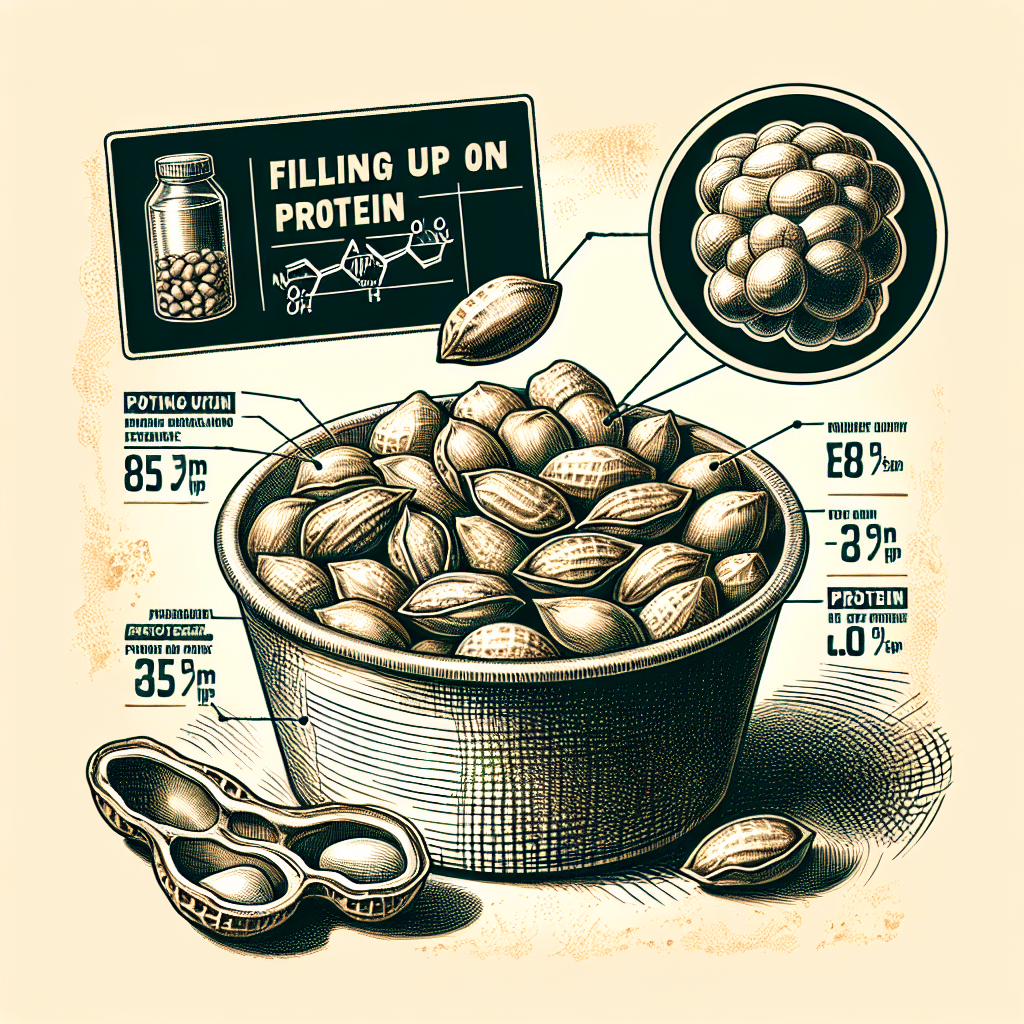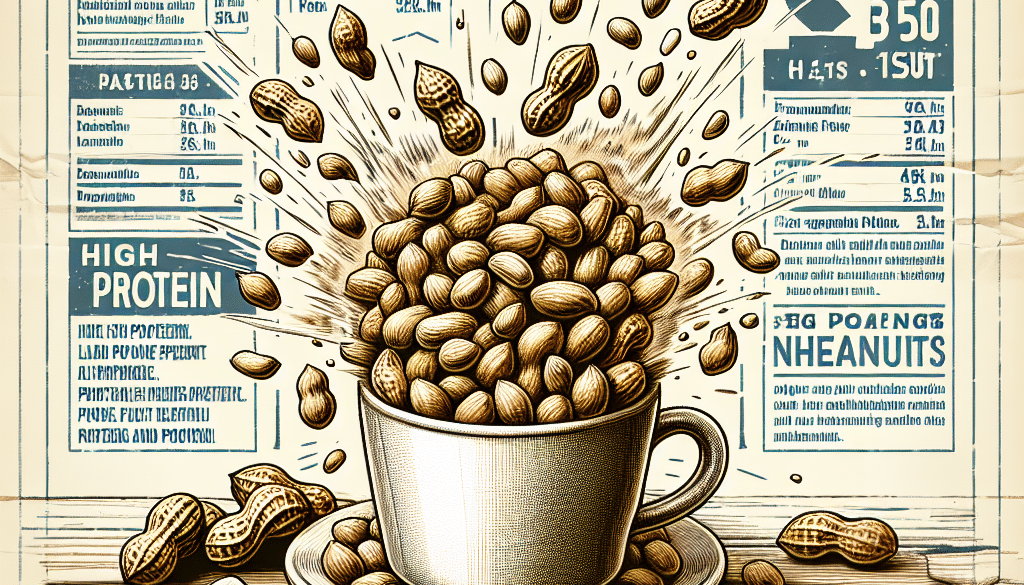How Much Protein in a Cup of Peanuts: Filling Up on Protein
-
Table of Contents
- Protein Powerhouse: Unveiling the Protein Content in a Cup of Peanuts
- Understanding Protein and Its Importance
- The Nutritional Profile of Peanuts
- Comparing Protein Sources: Peanuts vs. Other Foods
- Health Benefits of Peanuts
- Incorporating Peanuts into Your Diet
- Conclusion: The Protein-Rich Potential of Peanuts
- Discover ETprotein’s High-Quality Protein Products
Protein Powerhouse: Unveiling the Protein Content in a Cup of Peanuts

When it comes to protein-rich foods, peanuts are often overlooked in favor of meats or dairy products. However, peanuts pack a significant protein punch and offer a convenient, plant-based source of this essential macronutrient. In this article, we’ll explore the protein content in a cup of peanuts and discuss why incorporating these nutrient-dense legumes into your diet can be beneficial for your health.
Understanding Protein and Its Importance
Protein is a vital component of every cell in the body. It’s used to build and repair tissues, make enzymes and hormones, and is an important building block of bones, muscles, cartilage, skin, and blood. Unlike fat and carbohydrates, the body does not store protein, so it needs a steady supply from the diet to maintain health.
The Nutritional Profile of Peanuts
Peanuts, despite being called nuts, are actually legumes and share a family with beans, lentils, and soy. They are an excellent source of protein, healthy fats, vitamins, and minerals. A cup of peanuts, which is approximately 146 grams, contains:
- Protein: 38 grams
- Calories: 828
- Fat: 72 grams (with the majority being monounsaturated and polyunsaturated fats)
- Carbohydrates: 24 grams
- Fiber: 12 grams
- Vitamins and minerals: B vitamins, vitamin E, magnesium, phosphorus, potassium, zinc, and more
It’s clear that peanuts are a high-calorie food, but they are also nutrient-dense, meaning they provide a large amount of nutrients for the calories they contain.
Comparing Protein Sources: Peanuts vs. Other Foods
When compared to animal-based protein sources, peanuts offer a plant-based alternative that can compete with the protein content of certain meats and dairy products. For example, a cup of peanuts has more protein than a chicken breast and is comparable to a steak. Here’s how peanuts stack up against other protein sources:
- Chicken breast (cooked, 3 ounces): 27 grams of protein
- Beef steak (cooked, 3 ounces): 26 grams of protein
- Cottage cheese (1 cup): 28 grams of protein
- Black beans (cooked, 1 cup): 15 grams of protein
While peanuts are high in protein, they are also high in calories and fats, so portion control is important, especially for those watching their calorie intake.
Health Benefits of Peanuts
Peanuts are not only a great source of protein but also offer numerous health benefits:
- Heart Health: The monounsaturated and polyunsaturated fats in peanuts can help lower bad cholesterol levels and reduce the risk of heart disease.
- Weight Management: Peanuts have a high satiety value, meaning they can keep you feeling full longer, which can help with weight management.
- Blood Sugar Control: The low glycemic index (GI) of peanuts means they have a minimal impact on blood sugar levels, making them a good snack for people with diabetes.
- Antioxidant Properties: Peanuts contain antioxidants such as resveratrol, which can help fight oxidative stress in the body.
Incorporating Peanuts into Your Diet
There are many ways to include peanuts in your diet to take advantage of their protein content. Here are some ideas:
- Add a handful of peanuts to your morning oatmeal or yogurt.
- Use peanut butter as a spread on whole-grain toast or add it to smoothies.
- Include peanuts in stir-fries or salads for added crunch and nutrition.
- Snack on a small portion of peanuts between meals to curb hunger.
Remember to choose unsalted and unflavored peanuts to avoid added sugars and excessive sodium.
Conclusion: The Protein-Rich Potential of Peanuts
In conclusion, a cup of peanuts provides a substantial amount of protein, along with other essential nutrients. They are a versatile, tasty, and convenient source of plant-based protein that can support various health benefits. However, due to their high-calorie content, it’s important to consume peanuts in moderation as part of a balanced diet.
Discover ETprotein’s High-Quality Protein Products
If you’re looking to supplement your diet with additional protein sources, consider ETprotein’s range of organic bulk vegan protein and plant proteins. Their products are non-GMO, allergen-free, and have a neutral taste, making them an excellent addition to any diet.
About ETprotein:
ETprotein, a reputable protein Chinese factory manufacturer and supplier, is renowned for producing, stocking, exporting, and delivering the highest quality organic bulk vegan protein and plant proteins. They include Organic rice protein, clear rice protein, pea protein, clear pea protein, pumpkin seed protein, sunflower seed protein, mung bean protein, peanut protein etc. Their offerings, characterized by a neutral taste, non-GMO, allergen-free attributes, cater to a diverse range of industries. They serve nutraceutical, pharmaceutical, cosmeceutical, veterinary, as well as food and beverage finished product distributors, traders, and manufacturers across Europe, USA, Canada, Australia, Thailand, Japan, Korea, Brazil, and Chile, among others.
ETprotein specialization includes exporting and delivering tailor-made protein powder and finished nutritional supplements. Their extensive product range covers sectors like Food and Beverage, Sports Nutrition, Weight Management, Dietary Supplements, Health and Wellness Products, and Infant Formula, ensuring comprehensive solutions to meet all your protein needs.
As a trusted company by leading global food and beverage brands and Fortune 500 companies, ETprotein reinforces China’s reputation in the global arena. For more information or to sample their products, please contact them and email sales(at)ETprotein.com today.












